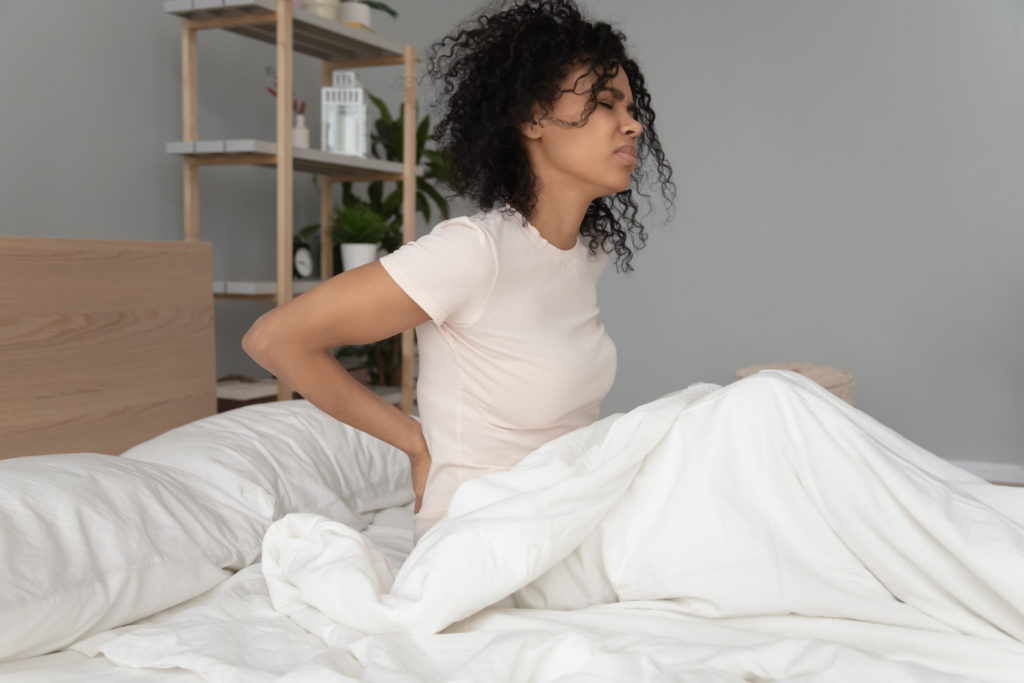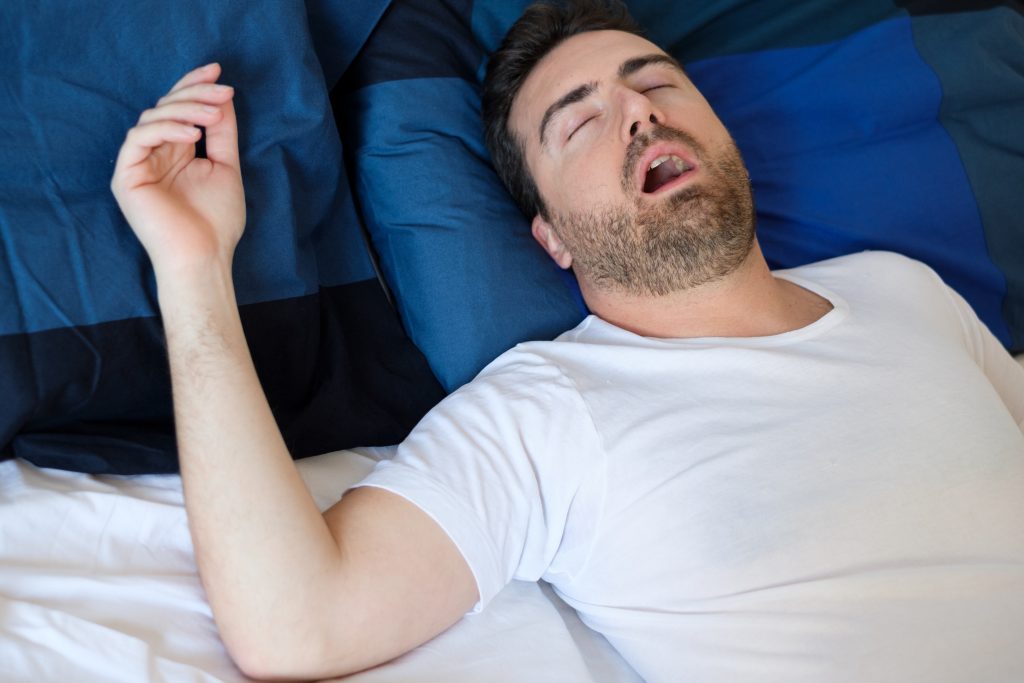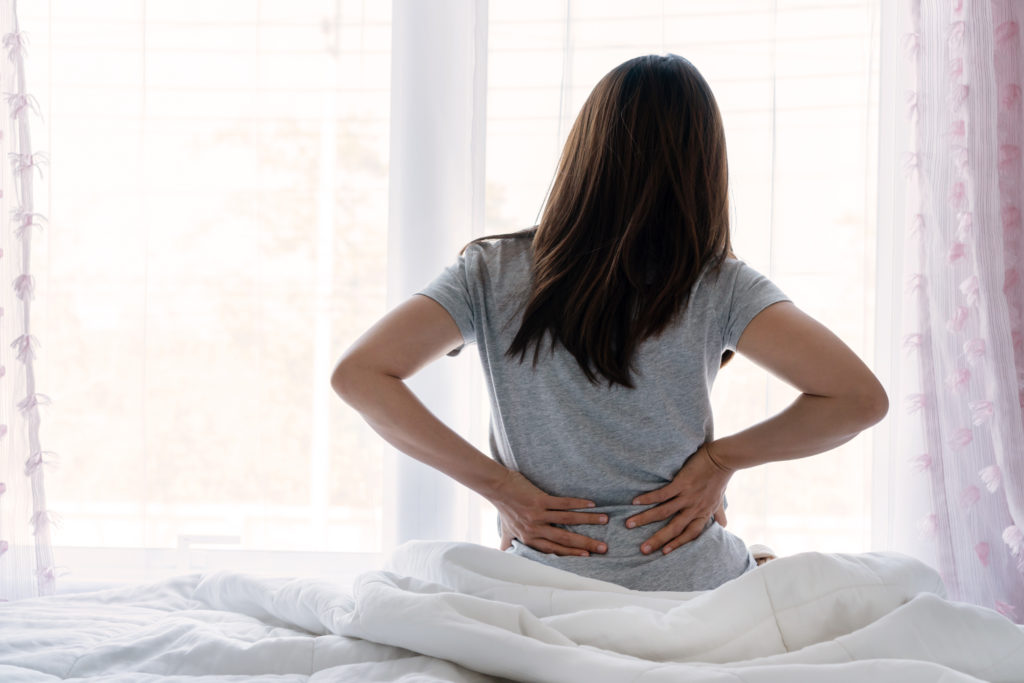August 24, 2022
5 Reasons why You’re Waking up with Body Aches
When you wake up, you may wonder, “Why does my body feel sore?” If your body often aches upon waking, there are a variety of possible causes, including your mattress, sleeping position, weight, sleep disorders, and underlying health conditions. Multiple reasons are most likely to blame.
Luckily, you can alter some of your sleeping and lifestyle habits to help prevent waking up with body aches. Choosing a better quality mattress, finding the proper sleeping position, and losing weight are a few ways to start. However, if you still have body aches after sleeping, it is time to talk to your doctor to find out if you have an underlying health or sleep disorder.
The following five factors can affect the severity of your waking body aches.
1. Poor quality mattress
Your mattress might be the source of why your body is sore. According to the Sleep Foundation, sleeping on a poor-quality mattress is one of the top reasons your body aches. Here are some characteristics of a poor mattress:
 Sagging
Sagging- Poor support
- Dust and allergen buildup
- Age
About seven to 10 years is the average lifespan of a mattress. However, other factors can affect the lifespan and durability of a mattress. If you have a mattress over seven to 10 years old without support, consider investing in a new mattress. When choosing a mattress, you should consider what you want and need. Do you require a mattress that helps soothe persistent back pain? Do you need a bed with excellent pressure point relief? What is your weight, and which mattress will provide the right support? Be sure to consider many such factors because when it comes to mattresses, one size does not fit all.
2. Sleeping position
Your sleeping position can cause your body to ache upon waking. Everyone’s best sleep position is also different. In general, side sleeping tends to be the best for most people, especially those with sleep breathing disorders such as obstructive sleep apnea.
Obstructive sleep apnea is the most common sleep-breathing disorder and occurs when a person stops breathing multiple times during the night. Obstructive sleep apnea is a severe condition, and it is essential to find treatment for your sleep disorder.
Side sleeping is generally best for the following people:
- Mothers-to-be
- Acid reflux sufferers
- People with back pain
- Snorers or those with sleep apnea
- People over the age of 65
If you are unsure if your sleeping position is causing your body to feel sore upon waking up, talk to your doctor for sleep position recommendations. Your doctor can help you identify if your body is sore from a certain sleeping position or if your muscles ache when you wake up due to something you are doing during the day. They may recommend a sleep study if they can’t identify why your body aches upon waking up after an initial consultation or recommend you seek treatment with a sleep specialist.
3. Being overweight
Carrying extra weight can make your body ache when you wake up. The excess weight puts pressure on your back and neck, causing pain. Being overweight can also cause sleep breathing disorders, drastically impacting sleep quality and how good you feel upon waking.
While losing weight may seem like an easy answer to improving the quality of your sleep, it might be difficult for you to maintain a weight loss routine, especially if you wake up with body aches.
To lose weight, talk to your doctor about your best option. It is generally best to lose weight slowly and steadily rather than make significant changes to your lifestyle all at once. However, small daily changes to your lifestyle can make a massive difference over time.
4. Sleep breathing disorders
Why do sleep breathing disorders cause body aches when you wake up? When you have a sleep breathing disorder, you may stop breathing while you sleep, and this causes a lack of oxygen. Oxygen is vital for your body to repair itself while you sleep. Without oxygen, your body cannot repair and may ache when you wake up.
Here are some common signs of a sleep-breathing disorder:
 Snoring, choking, or gasping while sleeping
Snoring, choking, or gasping while sleeping- An early morning headache
- Sleepiness during the daytime
- Loud snoring that is often punctuated by gasping or choking sounds
- Headaches in the morning that may persist for several hours after waking up
- Dry mouth as soon as you wake up
- Nighttime waking with restless sleep
- A greater need to urinate in the morning
- A feeling of irritability or frustration
- Difficulty concentrating
Sleep breathing disorders are severe conditions that can lead to heart disease and stroke. A lab sleep study is the gold standard to determine if you have a sleep breathing disorder. Your doctor can help you decide if a lab or home sleep test is best for you.
An underlying medical condition or being overweight can contribute to your sleep-breathing disorder.
Some common causes of sleep-breathing disorders include:
- Body weight that is too high. Having obesity dramatically increases your risk of sleep apnea. You may have difficulty breathing if you have fat deposits around your upper airway.
- Having tonsils that are enlarged and block the airway, especially in children,
- Being male. Sleep apnea is more common in men than in women.
- Older adults are significantly more likely to suffer from sleep apnea.
- Family history. You may be at a higher risk if you have family members with sleep apnea.
- Use of alcohol, sedatives, or tranquilizers. These substances relax the muscles in your throat, worsening obstructive sleep apnea.
- Smokers are three times more likely to have obstructive sleep apnea than are people who’ve never smoked. Smoking can increase the amount of inflammation and fluid retention in the upper airway.
- Nasal congestion.
- Medical conditions.
5. Underlying medical conditions
In addition to sleep breathing disorders, waking up with aches could signal other underlying medical conditions.
Conditions causing body aches upon waking include:
- Virus or infection (cold or flu)
- Stress or anxiety disorder
- Dehydration

- Anemia
- Vitamin D deficiency
- Mono
- Pneumonia
- Fibromyalgia
- Chronic fatigue syndrome
- Arthritis
- Lupus
- Lyme disease
- Histoplasmosis
- Multiple sclerosis
While some of these conditions are not permanent and are easily treated, others are more serious, requiring lifelong medication and lifestyle changes. That is why talking with your doctor is important when you have body aches after sleeping through the night.
Waking up with body aches can harm your health and mental well-being. The first step is to find the source of your body aches. Talking with a doctor can help you wake up feeling your best and live without body aches.
DISCLAIMER
The information featured in this site is general in nature. The site provides health information designed to complement your personal health management. It does not provide medical advice or health services and is not meant to replace professional advice or imply coverage of specific clinical services or products. The inclusion of links to other web sites does not imply any endorsement of the material on such websites.



